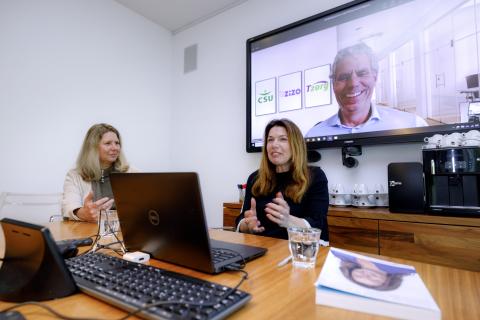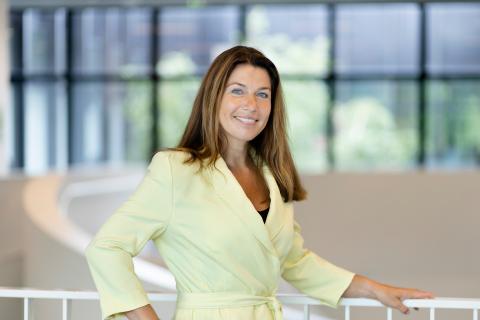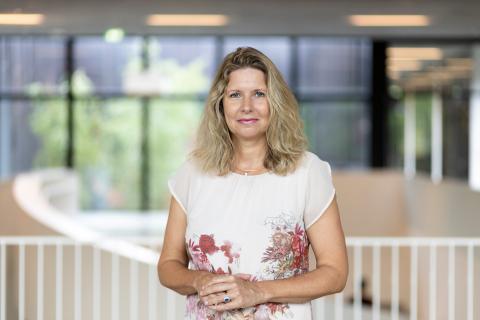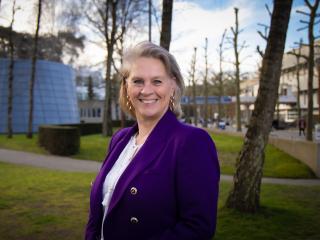In dialogue about a more inclusive labor market: ‘Some people are afraid of education and training’
Getting as many people into employment as possible might sound like a logical goal. Yet in our complex country, it’s easier said than done. How do we eliminate barriers and achieve a truly inclusive labor market? Tilburg professors Charissa Freese and Irmgard Borghouts discussed this subject with Marco Gramser of Total Care, one of Tilburg University’s partners in the field of inclusive labor markets and talent development.
Anybody who wants to pursue science together with commercial enterprises must proceed with caution. Research has to be independent. But on the other hand, cooperation can lead to greater depth and more opportunities. That’s certainly the case when you are studying the inclusive labor market. Because then you need to know what really motivates employers and employees. That’s exactly the theme that Tilburg professors of HRM and Societal Security – Charissa Freese and Irmgard Borghouts – are working on. They are working with partners such as Total Care, a large cleaning and care company based in Uden, whose brands include CSU, Tzorg and Zizo.
Fancy HR practices
At the invitation of Tilburg University Magazine, Professors Freese and Borghouts discussed the subject with Marco Gramser, Director of Public and Social Affairs at Total Care. The company is a very valuable partner in their view. According to Freese, academics tend to focus on things like ‘fancy HR practices’ at multinational companies. Those are settings where people with an academic background tend to be working, but at Total Care, which provides cleaning and care services, most employees have had a practical education. That makes it a valuable addition, helping to complete our picture of the labor market.

It’s important to step back and not just accept your gut feeling, but actually look at the facts. The university can help us to do that.
Marco Gramser, Director of Public and Social Affairs at Total Care
The company also has strong regional roots in Brabant. According to Freese, the region is home to many family businesses that truly care about their local community. “Our own research shows that some great things are happening in our province concerning the inclusive labor market.” Borghouts: “Total Care also interests us because it is an innovative company that wants to operate in a socially responsible manner.” The feeling is mutual: Gramser also sees his company's partnership with the university as valuable. “There is a lot of opportunism and short-termism in business. It’s important to step back and not just accept your gut feeling, but actually look at the facts. The university can help us to do that.” He thinks that science can reveal which policies work on the labor market, so that improvements can be made.
Short-term pain
The cleaning company CSU is contributing to inclusiveness in the labor market by providing work for asylum seekers and refugees, says Gramser. “Cleaning work does not require any extensive prior training. For this target group, we provide the training ourselves. These people have problems participating in society because of the language barrier, for example. As a company, we can help them get over that. If they go on to integrate further under their own steam, so much the better.”
The willingness to train staff for someone else is the key to achieving a more inclusive labor market
Irmgard Borghouts, Professor of HRM and Societal Security

Some of the staff trained by CSU go on to work for other companies. Borghouts praises the company for its willingness to train staff ‘for someone else’. “One CSU employee said to me: ‘If one of the employees that we give a chance to goes on to work for another company, then we’ve actually done something for the labor market.’ That willingness is the key to achieving a more inclusive labor market.”
But a generous training policy does not always draw praise from within the organization, says Gramser. “There are tensions. With the current tight labor market, companies want to retain every employee they can. My colleagues say to me: ‘It's great that you train people so broadly, but now I need to recruit somebody new again.’” Of course they try to make sure that employees can progress within the company wherever possible. But they have to accept that they can’t keep everybody because of the broad training that the company gives its staff. “That hurts in the short term, but over the longer term it makes us more attractive as an employer. It shows that we give people opportunities, and inevitably word gets around.”
Gramser also noticed that following the recent pandemic, it pays to invest in people. When hotels had closed their doors because of the pandemic, CSU chose not to let go of the cleaners who worked there. “We chose not to reorganize but to train them for other sectors. That increased their loyalty to us. Our people saw that we were not only looking at the short-term interests of the company, but we were also looking out for their interests. Employee satisfaction increased as a result.”
Momentum
At present, many forces are pushing us towards a more inclusive labor market. The labor shortage is pushing employers to look for new sources of labor. They are having to let go of the strict job descriptions with high educational requirements and be more open to people who have the right skills. An inclusive labor market is now higher up on the agenda of employers than it was around five years ago, believes Freese. And she sees a similar trend among political leaders. There is growing interest in an inclusive labor market, as we can see in the way that reducing precarious forms of employment is being prioritized.
In the current environment, there is every incentive for the government to remove obstacles to an inclusive labor market. All the participants in this dialogue want to achieve something different. If it were up to Gramser, the government in The Hague would make changes to the way benefits are allocated to make it more attractive to work more hours. At the same time, he says, those benefits should be made a lot easier to get. “Our target group – mainly workers with a practical education who work part-time – often rely on benefits. But they find it bizarrely difficult to apply for them. No wonder they make so little use of them.”
Neither is it always easy for people with an occupational disability to work in our country. According to Freese, we are not doing very well in the Netherlands, compared to other European countries. The Dutch government has tried to change that with the Participation Act. This requires employers to hire more people who have not been in work for a long time by imposing a quota. Employers who fail to meet the quota will face penalties. But according to Borghouts, this approach has not been successful. “You shouldn’t be punishing entrepreneurs, but supporting them. Give them expertise on how to help certain target groups get into work, for example.”
It irritates Gramser that the government so often chooses the path of distrust and coercion. “Start out by trusting people. Create a low-regulation environment with less bureaucracy. Don't spend the money on punishing bad behavior, but on rewarding good behavior. Give employers who create jobs for certain target groups a tax break, for example.”
Freese: “The government is out of step with practice. When the Participation Act was introduced, many employers who already had a very inclusive policy did not meet the rules that the government set. That was extremely demotivating.”

The world is changing. When you leave school, you won’t have enough knowledge and skills to see you through until you retire. People need to continue developing their knowledge and skills.
Charissa Freese, Professor of HRM and Societal Security
Framing education and training differently
There’s still a long way to go to eliminate barriers and achieve the dream of an inclusive labor market. Not just for the government, but for all of us. According to Freese, all actors in the labor market need to start working on this. “The world is changing. When you leave school, you won’t have enough knowledge and skills to see you through until you retire. People need to continue developing their knowledge and skills. Employers should be able to ask people what steps they’ve taken to work on their development. At the same time, they also need to invest in employees’ knowledge and experience, with or without a permanent employment contract.”
Borghouts believes that workers take too little advantage of opportunities to develop themselves: “That was what we saw in our ‘from job to job’ study. We looked at employees who had been made redundant, most of whom were offered the chance to do education or training. But only a quarter of them took that opportunity. Even though we have shown that this shortens the duration of unemployment.”
Motivating people to work on their own development is not easy according to Gramser. Just telling people that it’s good for their position on the labor market is not usually enough, he says. “Everybody knows that exercise is good for their health, but not everybody gets around to going to the gym. It works better when people have their own intrinsic motivation. That’s what you need to ask about.” He notices that many people who work in practical jobs are afraid of education and training because they have had very little experience of it – or a negative experience. “To motivate those people, you have to frame it differently. You can make use of methods like mentorships, feedback from colleagues or master-apprentice relationships.” Borghouts: “Science can help to identify the development needs of employees better – in typologies, for example.”
Contracts with illustrations
If there’s one thing that the discussion makes clear, it’s that understanding other people is vital. To understand somebody else’s motives, you have to keep asking questions, explains Gramser. “We clean the Johan Cruyff Arena in Amsterdam. Along with other employers, we were looking at whether we could offer our staff more working hours. We made our staff an offer: as well as cleaning, they could provide other services such as catering or maintenance work. But there was very little response, even though we know that people want to work more hours. When we talked to them, it turned out that they were afraid that they would be fired if they didn’t do the other work well enough. It goes to show that good communication is crucial.”
Total Care is doing its best to respond to its employees’ needs, according to Gramser. The best way to do this is to get them involved, he believes. For instance, the cleaning company CSU has developed visual contracts together with the cleaners, in which the text has been replaced by drawings. The company also has an internship office that is run by the interns themselves.
Freese and Borghouts are also convinced that the way to learn the most about inclusivity is to put it into practice. They noticed this when they hired colleagues with disabilities in their department. Borghouts: “Practice what you preach. We are now seeing where we can improve first hand.” Freese: “It’s only now that we’re discovering how difficult our work environment is for people who are different from the norm.”
Working with partners on an inclusive labor market
We cannot solve complex social issues such as those surrounding the labor market on our own. Tilburg University believes that partnerships with other disciplines and social partners can help. The university does this through the Academic Collaborative Center for the Inclusive Labor Market, for example, which was set up by Freese and Borghouts. Total Care is one of the social partners, along with ING, NS, KLM, UWV, Randstad, Rabobank, CNV, Philips and Achmea. In addition to the academic collaborative center, various other forms of collaboration with the university are possible. That includes providing internships, giving guest lectures and facilitating research, to name but a few. Tilburg University has plenty of experience collaborating on HR issues, such as in its People Management Center, whose partners include ASML, Deloitte, Aon and DSM.
Also in Tilburg University Magazine
Date of publication: 12 June 2023


